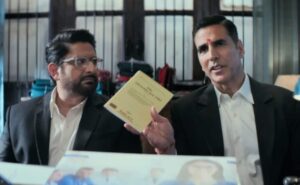
One of the things in A24’s online store is not like the others. Spend a moment browsing the indie studio’s wares and you’ll notice the word soundtrack in nearly all of the item descriptions. But then you’ll spot a true outlier: an album named only Mark William Lewis, with cover art depicting a hunched, vampiric figure, perched like a bird against the colorless London skyline.
The image is undeniably cinematic, which is why the thumbnail looks so at home nestled next to vinyl soundtracks for Midsommar and Bring Her Back. But it’s a surprisingly understated placement for an album that could represent a significant new chapter for A24: Lewis is the first artist the company has signed to its nascent record label, A24 Music, which until now has solely been a vehicle for the studio’s oft-memorable film scores.
A24 is entering the music business in earnest — and this mysterious, brooding Brit is its patient zero. It’s a surprising if perhaps inevitable development for a company whose expansionist impulses have made it far more than a movie studio in recent years. And it’s a peculiar honor bestowed upon Lewis, a singer-songwriter in his early 30s with a gruff voice and a knack for writing gloomily impressionistic tunes swathed in reverb and urban malaise. A product of South London’s thriving DIY scene, he grew up on a steady diet of poetry and magical-realist literature and sounds a bit like the genre-bending London artist King Krule’s harmonica-wielding cousin.
But Lewis isn’t much of a cinephile, and composing film scores was never his plan (though he’s open to it). In fact, in June, the musician told The Face that he “hadn’t even heard of A24” before the company approached him. When I meet Lewis at A24’s Manhattan offices in mid-July, he clarifies: He’s a horror fan — particularly horror “that’s kinda slightly kitsch” — and loves some A24 movies, citing Robert Eggers’s folk-horror breakout The Witch as a favorite.
As for the signing, “it was good timing,” he says, sipping boxed water in A24’s library, a high-shelved room that houses the studio’s handsome hardcover screenplay books as well as hundreds of unrelated volumes on cinema. “We’re kinda both defining our thing. I’m still defining my thing, and they’re obviously a new label, so they’re defining what their thing is, and it feels like a good matchup in that regard.”
Since its founding in 2012, A24 has had success supporting filmmakers still defining their thing. The studio has occupied a rarefied space, inspiring fierce loyalty from independent-film devotees. It’s increasingly perceived as an arbiter of cutting-edge Hollywood cool. It’s a unicorn in an embattled entertainment industry, a studio that’s both flush with cash, thanks in part to a recent $75 million VC financing round with a $3.5 billion valuation, and unafraid to take creative risks.
Though the company has financed and distributed critically hailed Best Picture winners like Moonlight and Everything Everywhere All at Once, its cultural cachet is arguably more tied to an edgier, darker sensibility — such as Ari Aster’s art-horror nightmares or the Safdie brothers’ high-anxiety Uncut Gems, films that inspired viewers to either become obsessive fans or walk out of the cinema in disgust. Those movies came equipped with audacious, scene-stealing scores — such as Colin Stetson’s harsh, groaning Hereditary score and Oneohtrix Point Never’s queasy Uncut Gems accompaniment — which, like many other A24 soundtracks, received splashy vinyl releases and considerable acclaim.
So it’s not surprising that the studio would venture deeper into the music industry proper, especially not after last year’s I Saw the TV Glow soundtrack, a glorified mixtape of indie names-to-know curated in the style of the hippest ’90s soundtracks.
In a recent essay appearing in the publication Dirt, writer Nicholas Russell argued that A24 has become not just a film studio but a savvy, multidisciplinary tastemaker. Despite detractors who see it as “a Zeitgeist-chasing machine,” Russell wrote, “everyone seems to be chasing what A24 has become synonymous with: brand loyalty.”
“They’ve been trying to, if not expand, then gain footholds in different areas of media,” Russell told me. “They have a contract with Apple TV+. They were doing stuff with HBO for a while. They have this way of trying to ‘diversify their portfolio’ in a way that doesn’t keep them beholden to strictly the movie business. They want to be, if not ubiquitous, to capture as many different audiences as possible.”
A24 has, for years now, harbored ambitions beyond filmmaking. Its television division has yielded hit shows like Euphoria and The Curse, the latter co-created by Benny Safdie and comedian Nathan Fielder. The company also struck a distribution deal last year for its screenplay books, lavish tomes immortalizing A24’s most successful scripts, which are now available in bookstores around the world. And the studio has purchased, and soon will reopen, an Off Broadway theater in the West Village, granting it a spot in the world of theater and live comedy.
So why not music? Can the studio replicate that brand loyalty in the music space? And is Lewis the vehicle to make it work? A possible obstacle is that the business of indie music has been thoroughly homogenized by the tyranny of algorithms, which prioritize all that is streamlined and familiar. Most artists who sound like Mark William Lewis earn the bulk of their income not from record sales but from touring and (fittingly enough) sometimes film and TV scoring. In her book Mood Machine: The Rise of Spotify and the Costs of the Perfect Playlist, journalist Liz Pelly recounts how the Spotify economy has reshaped indie labels; as one label executive told Pelly, “To be sustainable, you have to put out records that are going to get repeat listens in coffee shops.”
It’s unclear how that grim directive will jibe with the aesthetic of A24, a studio that cultivates enough mystique to persuade large audiences to go see movies as punishingly abrasive as Aster’s Eddington or as haunted and strange as I Saw the TV Glow. (Movies, in other words, not meant to play on coffee-shop televisions.)
A24’s hit movies can live or die at the box office, but they may find an afterlife on streaming services. Indie labels are at the mercy of streaming platforms, and new releases often fade quickly if they don’t land a lucky playlisting slot or fluke TikTok boost. It’s a depressing shift from indie-rock’s blog-era early-aughts boom.
And what are the stakes here for A24, a company that probably isn’t counting on Lewis’s new album to make as much money as, say, last year’s Civil War? That is, of course, probably fine. A24 routinely loses money on non-mainstream film releases (like Eddington and its divisive predecessor, Beau Is Afraid), and it may be fine with losing money on idiosyncratic musical releases, too, if it serves the auteurist branding the company seeks to project as it also releases Chinese blockbusters. In any case, the studio seems to be recruiting some seasoned industry personnel to help with the music side of things. Ben Gaffin, an artist manager and former director of A&R at 4AD (who, among other achievements, brought the synth-pop favorites Future Islands to 4AD), is now working with A24’s label.
While the company is pretty tight-lipped about its long-term plans in music, and A24 executives have a policy of not speaking to the press on the record, it did agree to answer some of my questions in an interview — provided that no particular A24 employee be quoted by name. During this interview with an employee involved with the label, the company confirmed that it is both recruiting staff for its music division and scouting potential new signings. “For us, everything that we do is really about the creators that we work with — the filmmakers, the composers, the musicians,” A24 Music says. “This is really just the next iteration of that. It’s just expanding on working with creators in a new lane.” So why sign Lewis, an idiosyncratic artist with no obvious mainstream appeal? “We feel like Mark is doing something really different, and his music sounds both timeless and very timely,” A24 Music explains.
That strategy has worked for film, where a robust audience tends to embrace (and debate) the offbeat films it releases. But there may not be a universe of fiending Letterboxd dorks ready to uplift a weirdo like Lewis on the charts. So a lingering question remains: What might Lewis represent to an audience that knows little about music but loves A24 movies? The company could have signed a bigger, splashier name to herald its shift into music, but to my mind, signing this mystery man mirrors its preference for establishing new talent under its own banner instead of merely recruiting established names. That’s the approach the studio has typically used in filmmaking. It remains to be seen if it can work in music.
Lewis had already recorded his new album when his management company, Scenic Route, connected him with A24. When the record arrives, on September 12, it will mark a milestone for both A24 and the artist himself. Though it’s not his debut record, he decided to keep it self-titled — a way of announcing himself to the world, saying, “This is my sound.”
A24’s record deal was clearly favorable enough to pique the artist’s interest, though he is mum about the terms of the deal — just that the label has been incredibly helpful about “facilitating my vision” and suggesting people to work with him on artwork. And, since the signing, his ambitions about reaching a large audience have “automatically gone up with the way they speak about it.”
Besides, Lewis’s music is evocative, moodily compelling, and accompanied by a distinct visual palette. Could his songs soundtrack movies? Definitely. Will they? Who knows. But like the most interesting A24-affiliated filmmakers, his work ushers you into a world of its own without telling you exactly what it means.
With its first signing, a moody Brit named Mark William Lewis, the auteurist film juggernaut starts a record label. Why?

































































